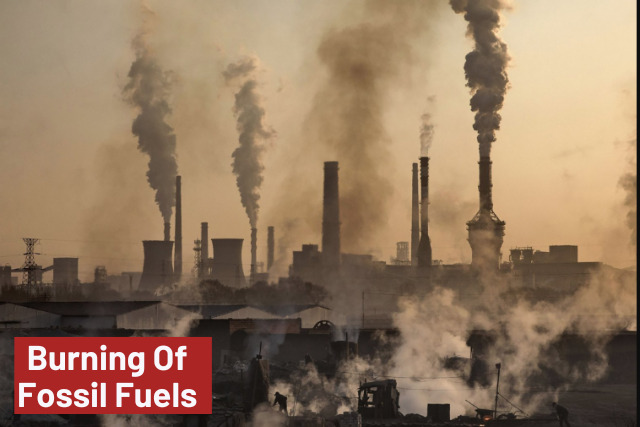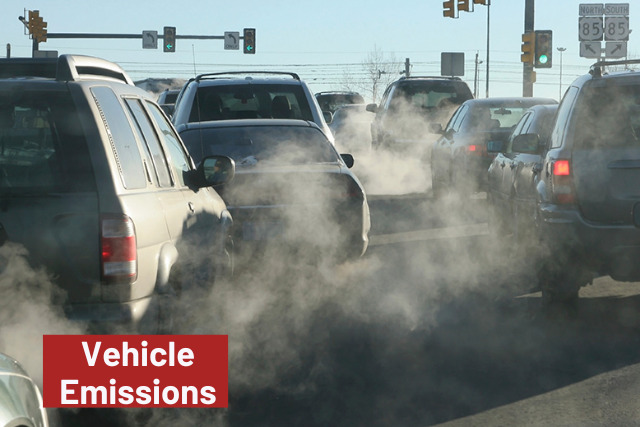Air pollution is a severe global problem. It can devastate the environment and human health. It occurs when pollutants, including dust particles, gases, fumes, and smoke, are released into the atmosphere and contaminate the air we breathe.
- Air pollution can have significant impacts on human health and the environment. In the short term, it can cause respiratory ailments such as asthma attacks or irritation of the eyes, nose, and throat.
- Long-term exposure to pollutants has increased the risk of chronic conditions like cancer, heart disease, and neurological disorders.
Air pollution can also damage the environment by contributing to climate change, acid rain, and depletion of the ozone layer.
Air Pollution Causes, Effects & Solution
Causes:
1. Burning Of Fossil Fuels

Burning fossil fuels such as coal, petrol, and other factory combustibles are the primary source of pollution. These fuel emissions contain various harmful pollutants. These include nitrogen oxide, sulfur dioxide, and carbon monoxide, which damage the ozone layer.
2. Vehicle Emissions

The increasing number of vehicles on the road is a significant factor in pollution. Automobile exhaust produces various greenhouse gases. These are carbon dioxide, nitrogen oxides, and other chemicals. They are extremely dangerous to human health.
3. Deforestation
Trees play a vital role in maintaining the balance of oxygen and carbon dioxide in the atmosphere. Unfortunately, deforestation has decreased the number of trees. It releases vast amounts of carbon dioxide into the atmosphere.
4. Industrial Emissions
Factories in production and manufacturing release significant quantities of smoke and other toxic gases into the air due to incomplete combustion processes. These industrial emissions contain dangerous chemicals. These are sulfur dioxide, nitrogen oxide, and carbon monoxide.
5. Household And Agricultural Activities
Household activities like burning plastics and agricultural practices like burning crop residue or using pesticides also contribute to pollution. These inappropriate practices emit large amounts of toxic gases. They create further environmental damage.
By understanding the causes and effects of pollution, we can all work together to reduce its impact on our environment and health.
Taking steps such as reducing our carbon footprint, choosing environmentally-friendly transportation options, planting more trees, and limiting the use of pollutants in agricultural practices can all help improve quality.
Working together, we can create a healthier environment for ourselves and future generations.
Effects Of Air pollution:
Air pollution Health Impacts
Air pollution has been linked to various respiratory and cardiovascular diseases, such as asthma, lung cancer, stroke, and heart disease.
Air Pollution Environmental Damage
Acid rain caused by air pollution damages vegetation, soil fertility, and water resources. Additionally, it contributes to global warming by trapping heat in the atmosphere.
Air Pollution Ecosystem Effects
Aquatic organisms can also absorb pollutants from pollution, which affects their growth and reproduction process.
Disturbances In Climate Patterns
Air pollution can lead to climate changes like droughts and floods, negatively affecting crops and other plants essential for human survival.
Loss Of Biodiversity
Some species of flora and fauna have become extinct due to pollution. This reduces the diversity of species in an ecosystem and increases the risk for other species.
Deterioration Of Building Structures
Air pollution also causes building structure deterioration by corroding metals, deteriorating stone facades, and discoloring paintwork.
Air Pollution Economic Losses
Air pollution can lead to economic losses due to health costs, reduced land productivity, damage to infrastructure, etc.
Air Pollution Soil Contamination
Some pollutants, like lead, can accumulate in the soil, making it toxic for plants and animals. This can lead to a decrease in soil fertility and ultimately reduce food production.
Adverse Effects On Human Mental Health
The effects of pollution can also include psychological distress and depression, especially among people exposed to high levels of pollutants.
Damage To Cultural Heritage
Air pollution has been known to cause damage to cultural heritage sites like monuments and artwork. This is due to the build-up of pollutants on the surfaces of these structures, which can erode them over time.
The Solution To Air Pollution:
1. Reduce The Use Of Fossil Fuels
How to reduce air pollution? Burning fossil fuels such as coal and gas is one of the major contributors to pollution. We can reduce pollution by using renewable energy sources like solar, wind, and hydroelectricity for electricity generation and switching to electric vehicles for transportation.
2. Improve Public Transportation
We can improve air quality by increasing the use of public transport and reducing the number of private vehicles. This will reduce emissions from vehicles and reduce traffic congestion.
3. Plant More Trees
Trees can absorb pollutants in the air, providing us with cleaner air. Planting more trees also has other benefits, such as providing shade, reducing noise pollution, and creating habitats for wildlife.
4. Reduce Waste
Reducing the amount of waste we produce is essential to improve quality, as many pollutants are released when waste is burned. We should reduce our consumption and properly dispose of our trash, so it is not burned.
FAQs
1. What Are Some Ways To Reduce Air Pollution?
There are several ways to reduce air pollution:
- Using public transportation or carpooling.
- Reducing energy consumption in the home.
- Switching to renewable sources of energy like solar and wind power.
- Planting trees to absorb pollutants from the air.
- Avoiding the use of aerosol sprays.
- Reducing the burning of wood and other fossil fuels.
2. What Are Some Sources Of Air Pollution?
The main sources of pollution include emissions from industrial and commercial activities, burning of fossil fuels, household activities like burning wood, agricultural activities such as fertilizer application, and natural sources like volcanic eruptions, forest fires, and dust storms.
3. How Does Air Pollution Affect Human Health?
Air pollution has been linked to various respiratory and cardiovascular diseases, such as asthma, lung cancer, stroke, and heart disease. Long-term exposure to pollutants can also lead to cancer and other serious illnesses like bronchitis or pneumonia.
4. What Are The Environmental Effects Of Air Pollution?
Air pollution can cause acid rain, global warming, and damage to vegetation, soil fertility, and water resources. Additionally, it can reduce biodiversity by decreasing the number of species in an ecosystem.
5. How Does Air Pollution Affect The Economy?
The effects of pollution on the economy are wide-ranging and include health care costs, reduced land productivity, damage to buildings and infrastructure, and decreased tourism. Additionally, pollution can lead to economic losses due to its effects on crops and other plants essential for human survival.
Conclusion:
We need to understand the causes and effects of pollution to take steps to reduce it. By taking collective action, we can protect our environment from the damaging effects of air pollution and create a healthier future for ourselves and the planet.
Also Read
- lifetime-fitness-membership-prices-locations
- membership-levels-at-lifetime-fitness
- everything-you-need-to-know-about-la-fitness
- 40 Junk Food List | Healthy And Unhealthy Food
- Lifetime Onyx Membership: What Is It- Advantage & Price
- What is Ursolic acid? Benefits, Side effects and Supplements
